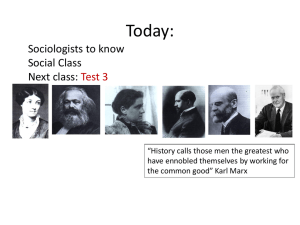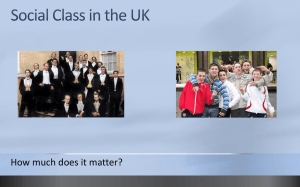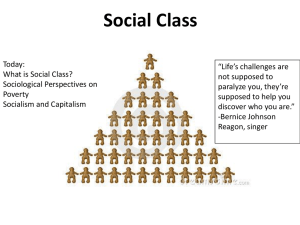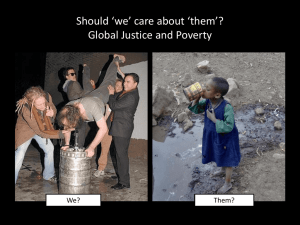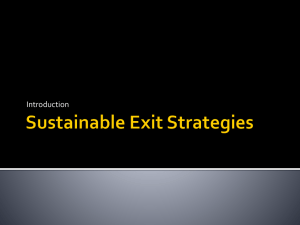Social Class
advertisement
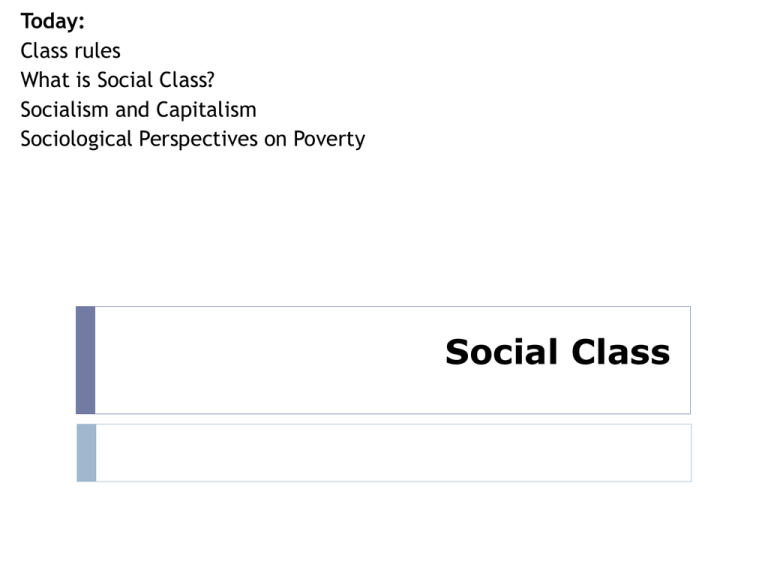
Today: Class rules What is Social Class? Socialism and Capitalism Sociological Perspectives on Poverty Social Class Outline What is social class? • Max Weber’s view • Karl Marx’s view Causes of poverty • Conflict Perspective • Karl Marx • C. Wright Mills Power Elite • Social Stratification • Functionalist Perspective • Symbolic Interactionist Perspective Capitalism and Socialism What is social class? According to Max Weber: a large group of people who rank closely to one another in terms of wealth, power, and prestige. class/wealth power prestige Property and income minus debt Ability to carry out one’s will despite the resistance of others The level of regard or respect and individual or their position demands 1864-1920 Status consistent vs. Status inconsistent Most people rank equally on all the measures of social class (status consistent) those who are not (status inconsistent) tend to experience frustration class/wealth power prestige Property and income Ability to carry out The level of regard minus debt one’s will despite the or respect and resistance of others individual or their position demand What is social class? According to Karl Marx: a system of “haves” and “have-nots” based on the means of production 2 classes: bourgeoisie (capitalists) and proletariat Lawyer who works for a firm and clients 1818 –1883 Independent cab driver who owns his taxi Causes of Poverty Conflict Perspective According to Karl Marx the ruling class control the economic system for its own benefit and exploits and oppresses the masses Karl Marx •German •Published Communist Manifesto in 1848 C. Wright Mills Mills described the structure of power in the United States in his book The Power Elite. According to Mills, the power elite are key people in three major institutions of modern society, government, military, and economy. 1916-1962 Power Elite Political elite: highest political leaders, president, key cabinet members, close advisers. The military elite: high-ranking military officials. Economic elite: major corporate owners and directors The power elite are a small group of people who control a disproportionate amount of wealth, privilege, and access to decision-making of global consequence What is social stratification? Institutionalized pattern of inequality Some people get more access to resources than others Reflecting inequalities in life chances based on membership in a group Class Rules Respect: It is essential that all students in class treat each other with respect. Learning can only take place in a positive environment and all students are expected to behave accordingly: • Side bar conversations and other distractions during class are unacceptable. • The consequences for distractions in class are losing all participation points (a deduction of 15 points from your grade). The El Camino College faculty, staff, and administration are dedicated to maintaining an optimal learning environment. The standards of behavior as outlined above are essential to the maintenance of a quality college environment. Violation of classroom policies will lead to disciplinary action. How has U.S. policy influenced social stratification? View: The Way We Live. Ups and Downs of Social Stratification Discuss your answers in groups of 2-4 The American Dream-Rags to Riches America is the land of opportunities, anyone who works hard enough can achieve anything and accomplish any goal. Do you agree or disagree with this statement? Why? This belief is called Horatio Alger myth: the belief that due to limitless possibilities anyone can get ahead if he or she tries hard enough Mid to late 1800’s Causes of Poverty Functionalist Perspective Poverty persists because it performs some positive function for society or at least some groups in society Causes of Poverty Functionalist Perspective Sociologists Kingsley Davis and Wilber Moore (1945) highly criticized view: There is a relationship between the contributions people make to society and the rewards they receive Talents are rewarded and all positions in a society (doctors and janitors alike) must be filled Poverty is society’s mechanism to discourage people from neglecting their social duties Read Excerpts from Herbert J. Gans. The Uses of Poverty: The Poor Pay All. Social Policy July/August 1971: pp. 20-24. 1971 to 2011 Do his descriptions of functions of poverty still exist today? Causes of Poverty Interactionist Perspective- 1st view People in poverty adapt to their life circumstances Allowing them to still feel good about themselves. Make it more difficult for poor people to improve their circumstances. Criticized because it seems to “blame the victim” Symbolic Interactionist Perspective 2nd view Labels of poor: View of wealthy: •irresponsible •lazy •low motivation •low ability •low morals •capable •hard working •motivated •deserving of wealth Which explanation of poverty applies best to today’s economic crisis? 1. Symbolic Interactionist A: people get accustomed to living in poverty and therefore have difficulty changing the situation 2. Symbolic Interactionist B: people in poverty get labeled as lazy and lose out on opportunities due to the label 3. Structural Functionalist: poverty is a functional in society, it motivates people to seek higher rewards 4. Conflict Theory: The masses are exploited by the few who have money and power Socialism and Capitalism Socialism Economic system in which the means of producing goods and services are collectively owned. Capitalism Economic system in which private individuals or groups invest capital to produce goods and services to sell for a profit in a competitive market. Socialism and Capitalism View Michael Moore’s: Capitalism: A Love Story Terms: Fannie Mae (The Federal National Mortgage Association) Freddie Mac (Federal Home Mortgage Corporation): Mortgage finance lenders that have operated since 1968 as government sponsored enterprises (GSEs). Privately owned and operated by shareholders, but protected financially by the support of the Federal Government. Coming up: Next week No Class Spring Break For April 21st: Read Ch 8 and article posted on class website White Privilege, print out and bring to class. Due A #4: Stereotype: • Be prepared to discuss a stereotype or label you feel others have of a group you belong to • Prepare to discuss how it effects you • Does not have to be a racial or ethnic group) • 4 points. Nothing needs to be typed or turned in
